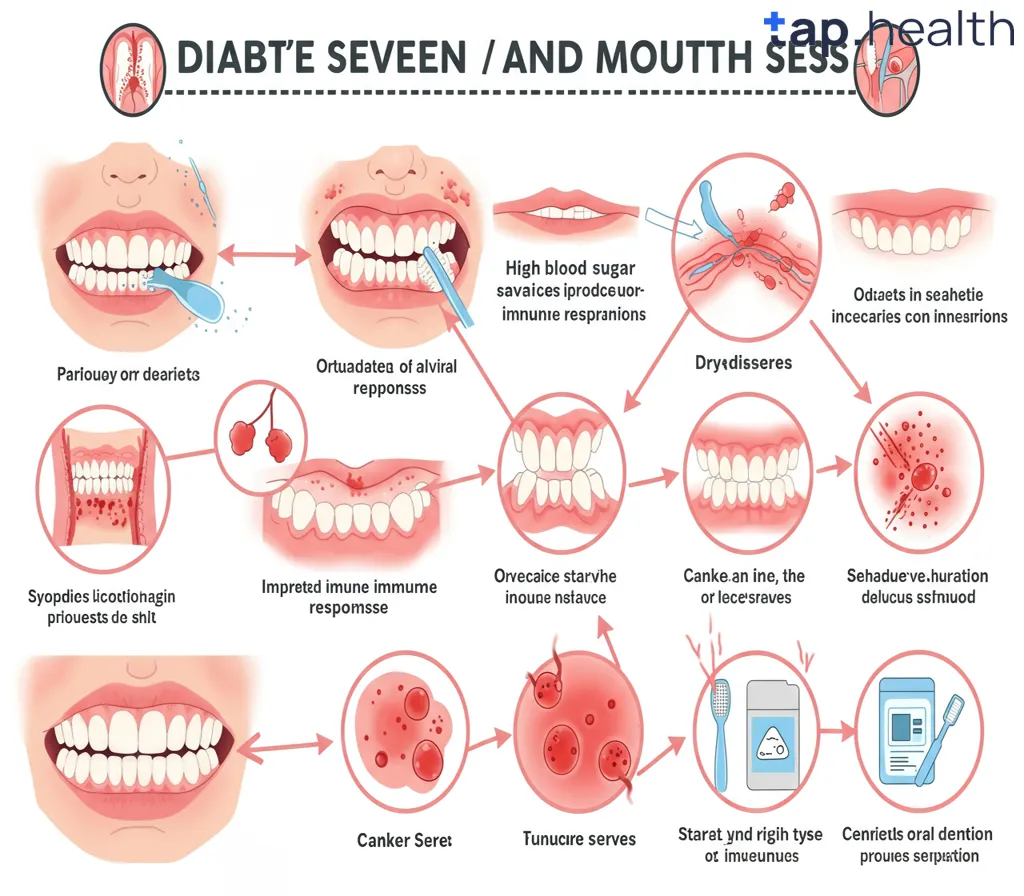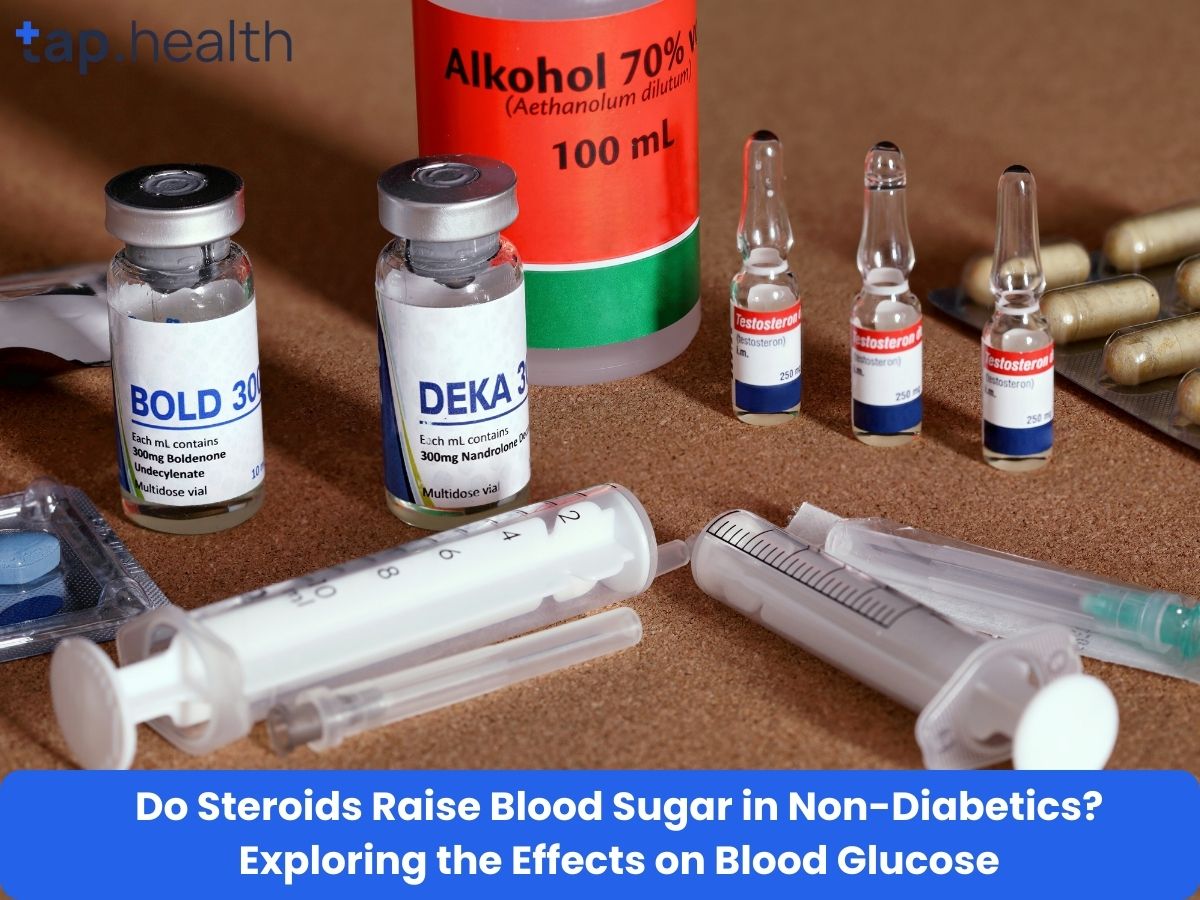Diabetes is a condition that affects how your body processes sugar (glucose). But beyond the typical symptoms of high blood sugar, did you know diabetes can also affect your mouth? Many people with diabetes struggle with various oral health problems, and one of the most common issues is mouth sores.
If you’ve been wondering whether diabetes can cause mouth sores, you’re not alone. In this article, we will explain how diabetes can lead to mouth sores, the types of sores you might encounter, and the best ways to manage and prevent them. So, let’s dive into it!
What Are Mouth Sores?
Before we explore how diabetes is linked to mouth sores, let’s first understand what mouth sores are.
Mouth sores are painful spots that can appear inside your mouth. They can vary in size, color, and pain level. These sores can form on your gums, the inside of your cheeks, your tongue, the roof of your mouth, or even your lips.
Some common types of mouth sores include:
- Canker sores: Small, round, painful ulcers inside the mouth.
- Cold sores: Blisters typically caused by the herpes simplex virus.
- Thrush: A fungal infection that can cause white patches in the mouth.
- Dry mouth sores: Result from a lack of moisture, often linked to diabetes.
Mouth sores can make talking, eating, and drinking painful. They’re often linked to underlying health conditions, including diabetes.
Can Diabetes Cause Mouth Sores?
Yes, diabetes can cause mouth sores. High blood sugar levels can weaken your immune system, making it harder for your body to fight off infections. This can lead to a variety of oral health problems, including mouth sores.
Here’s how diabetes can lead to mouth sores:
1. High Blood Sugar and Dry Mouth
When your blood sugar is consistently high, it can lead to dry mouth (xerostomia). This is because high blood sugar increases urination, which causes dehydration. A dry mouth creates an ideal environment for mouth sores to develop because the lack of saliva reduces your mouth’s ability to heal and fight off bacteria.
2. Weakened Immune System
Diabetes weakens your immune system, making you more susceptible to infections. When your immune system is compromised, bacteria and viruses that cause sores in the mouth can thrive. This can lead to frequent infections, including canker sores and thrush.
3. Poor Blood Circulation
In people with diabetes, poor circulation is common. This can slow down the healing process of mouth sores, making them last longer and become more painful.
4. Gum Disease (Periodontal Disease)
Gum disease is another side effect of diabetes that can cause mouth sores. High blood sugar levels can contribute to gum inflammation and infection, leading to painful sores in the gums or around the teeth. Gum disease can also worsen existing sores and slow the healing process.
Types of Mouth Sores Caused by Diabetes
There are several types of mouth sores that are more likely to occur in people with diabetes. Understanding these types can help you identify the sores and take action to treat them.
1. Canker Sores
Canker sores are small, round ulcers that appear on the inside of your mouth. They are usually white or yellow with a red border and are painful. People with diabetes are more prone to canker sores due to weakened immune systems and high blood sugar levels.
2. Cold Sores
Cold sores are caused by the herpes simplex virus. While they aren’t directly caused by diabetes, people with diabetes are more susceptible to cold sores due to weakened immune function. Cold sores can appear on your lips or around your mouth and are often triggered by stress, fever, or illness.
3. Thrush
Thrush is a fungal infection caused by an overgrowth of Candida yeast. It results in white patches that can develop on your tongue, the roof of your mouth, and the inside of your cheeks. Diabetes increases the risk of developing thrush because high blood sugar levels promote yeast growth.
4. Dry Mouth Sores
A dry mouth caused by diabetes can lead to sores. When there isn’t enough saliva, the tissues in your mouth become dry and irritated. This can cause sores to develop, especially on the gums or tongue.
Why Are People with Diabetes More Likely to Get Mouth Sores?
People with diabetes have a higher risk of developing mouth sores for several reasons:
1. Blood Sugar Imbalances
When blood sugar levels are high, it can lead to inflammation in the mouth, which makes sores more likely to form.
2. Reduced Saliva Production
Diabetes often reduces saliva production, leading to a dry mouth. Saliva helps prevent infections by washing away food particles and bacteria. When saliva production is low, the mouth is more prone to irritation, leading to sores.
3. Compromised Immune System
High blood sugar weakens the immune system, making it easier for bacteria, viruses, and fungi to thrive in the mouth and cause infections.
4. Poor Circulation
As mentioned, diabetes can affect circulation, making it harder for the body to heal itself. This means mouth sores may take longer to heal and become more painful.
How to Treat and Prevent Mouth Sores in Diabetes
Mouth sores can be uncomfortable, but there are steps you can take to manage and prevent them. Here are some tips:
1. Control Your Blood Sugar
The most important step in preventing mouth sores is to control your blood sugar levels. Keeping your blood sugar in check helps prevent the conditions that lead to mouth sores.
2. Practice Good Oral Hygiene
Brush your teeth at least twice a day with fluoride toothpaste and floss daily. This helps remove food particles and bacteria from your mouth, preventing infections that could lead to sores.
3. Stay Hydrated
Drink plenty of water throughout the day to keep your mouth moist and help prevent dry mouth. Sugar-free gum or lozenges can also stimulate saliva production.
4. Use a Humidifier
If you live in a dry climate or have a dry mouth, using a humidifier can add moisture to the air and prevent your mouth from becoming too dry.
5. Visit Your Dentist Regularly
Regular dental checkups are important for people with diabetes. Your dentist can help identify and treat oral health problems, including mouth sores, before they become serious.
6. Avoid Irritating Foods
Spicy, acidic, or crunchy foods can irritate mouth sores and make them worse. Stick to soft, bland foods until your sores heal.
7. Use Over-the-Counter Remedies
Over-the-counter products like mouthwashes or gels can help relieve pain and promote healing of mouth sores. These products can be found at most drugstores.
Common Questions About Diabetes and Mouth Sores
Can diabetes cause mouth ulcers?
Yes, diabetes can cause mouth ulcers, particularly when blood sugar levels are poorly controlled. These ulcers are usually a result of a weakened immune system and poor blood circulation.
How can I tell if my mouth sores are related to diabetes?
If you have diabetes and are experiencing frequent or painful mouth sores, it could be related to your condition. Mouth sores caused by diabetes often take longer to heal and may be accompanied by dry mouth or gum disease.
What are the signs of mouth infections in people with diabetes?
Signs of mouth infections in people with diabetes include pain or tenderness in the gums, white patches in the mouth, persistent bad breath, or swollen, red gums. If left untreated, these infections can lead to more serious oral health problems.
Is there a link between diabetes and thrush?
Yes, there is a link between diabetes and thrush. High blood sugar levels can lead to an overgrowth of Candida yeast, which causes thrush. People with poorly controlled diabetes are more likely to develop this fungal infection in the mouth.
How can I prevent mouth sores if I have diabetes?
To prevent mouth sores, it’s important to maintain good oral hygiene, control your blood sugar, stay hydrated, and visit your dentist regularly. Managing your diabetes effectively is key to preventing mouth sores.
Conclusion
Diabetes can certainly cause mouth sores, and managing the condition effectively can help prevent and treat these painful spots. By controlling your blood sugar levels, practicing good oral hygiene, and staying hydrated, you can reduce your risk of developing mouth sores and ensure better oral health. If you experience frequent or severe mouth sores, consult with your healthcare provider for the best treatment options.



